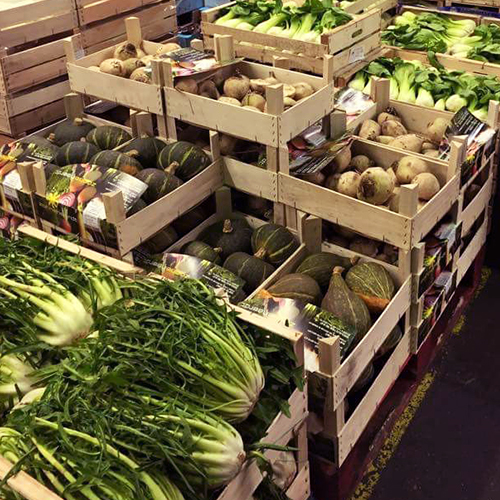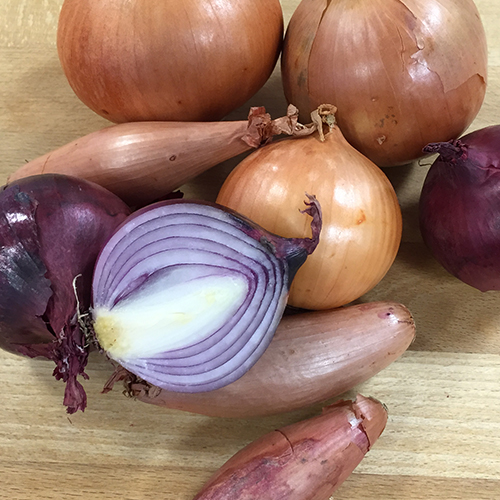Until the advent of refrigerators and freezers people ate seasonally and locally, and in many parts of the world they still do. I am convinced that simply cooked vegetarian food in India tastes so amazing because the ingredients are fresh from the market, seasonal and local.
For most of us this is an unsettling thought. We want whatever food we fancy all year round, and thanks to the supermarket we have that option.
The Four Seasons of Food
Fruit and vegetables have seasons; periods of time where conditions provide optimum harvests or flavour. If a food is harvested when it is naturally ripe not only will it have a great taste, but it will also be bursting with health-boosting vitamins and minerals.
When seasons change our physical needs do too, there’s a reason we crave wholesome hearty meals in the winter and lightweight salads in the summer. Seasonal vegetables help us meet our health challenges. A diet based around seasonality ensures varied, local and seasonal consumption and this can help keep mind and body well-balanced.
I know it’s a real luxury having all kinds of produce all year round, but by not listening to the seasons and our bodies we are losing out on a number of benefits.
The Benefits of Eating Seasonally
1. Health
Fruit and vegetables lose their nutrients once they are picked, so fresh produce naturally ripened has more vitamins, anti-oxidants and minerals.
In the winter when it’s cold we have a need for food that’s warming and wholesome like pumpkins and squashes. It’s a well-known fact that the beta carotene in the orange pigment of pumpkins helps to keep your immune system in check at a time when it’s most needed. In the summer when it’s hot, calm and cooling produce like radish, spinach, cucumber and strawberries are all in-season.
In Indian cooking the way spices are used also alters from season to season, because our bodies have different nutritional needs and it is thought that we are more likely to pick up certain viruses and bugs at certain times of the year. This intrinsic knowledge about spices, herbs and vegetables comes from food and cooking being so central to family life and culture in India.
Winter spicing influences the body to warm from within with more garlic, mustard and black pepper, whereas in the spring the use of fresh mint, shredded coconut, fennel seeds and coriander all have cooling properties.
2. Saving the pennies
Probably the most compelling reason to eat seasonally is that you save money. When you buy in-season the produce is available in abundance so basic economics principles means that it costs less for farmers to distribute to shops and therefore less to buy.
3. Flavour
The most important principle of seasonal produce is that it tastes great. It’s grown close to home and harvested when it’s at the height of ripeness. It costs less to distribute and there is no need for additives or preservatives as it hasn’t got far to be transported.
Foods that are out-of-season either have to be shipped in are often picked unripe and have to survive long trips or are grown in hothouses where they are artificially ripened. Either way it’s the flavour that suffers.
4. Variety is the spice of life
Eating a seasonal diet is not only good for your budget and health, but rotating ingredients seasonally can keep food interesting and help you flex your cooking muscle. It’s easy to work out what is seasonal – it’s the stuff that’s available in your grocery store or farm shop that’s piled high and it looks fresh. Remember don’t just shop with your eyes – use your nose and feel what you are buying. If it looks, smells and feels ripe you are on to a winner.
5. Keep it local
Local producers mean that the food you buy is likely to be even fresher thanks to reduced transportation time, and you’re also doing your bit for the environment, reducing your carbon footprint. And you will be supporting your local businesses - now that’s a lot of wins.
Guidelines to seasonal produce
Spring is the time of new beginnings, so your cooking should try to include new tender leafy vegetables such as beautiful early peas, baby spinach, lettuce and chard. Go for fragrant freshening herbs and spices like basil and dill.
In summer think light, fresh ingredients; lots of fruit such as strawberries, plums, corn, summer squashes. Get those lovely zingy fresh herbs in salads and chutneys such as coriander and mint. Light spices like citrusy coriander seed are fantastic too.
As you move into colourful autumn choose warming and hearty vegetables such as sweet potatoes, garlic, and squashes. Using warming herbs and spices like ginger, garlic, peppercorns, chilli and mustard seeds is a must.
The cold winter months call for vegetables which have taken longer to grow and will also store for longer through the harsh weather. These include root vegetables, potatoes, onions, garlic as well as nuts that are packed with nutritious oils.
As you select your seasonal foods here are a few things to keep in mind:
- Think fresh rather than pre-prepared
- Try something new and experiment with new ingredients
- Source local ingredients
- Keep your cooking new and exciting
- Remember is ok to compromise when you have to. This should not be a chore.
- Have fun!




Comments